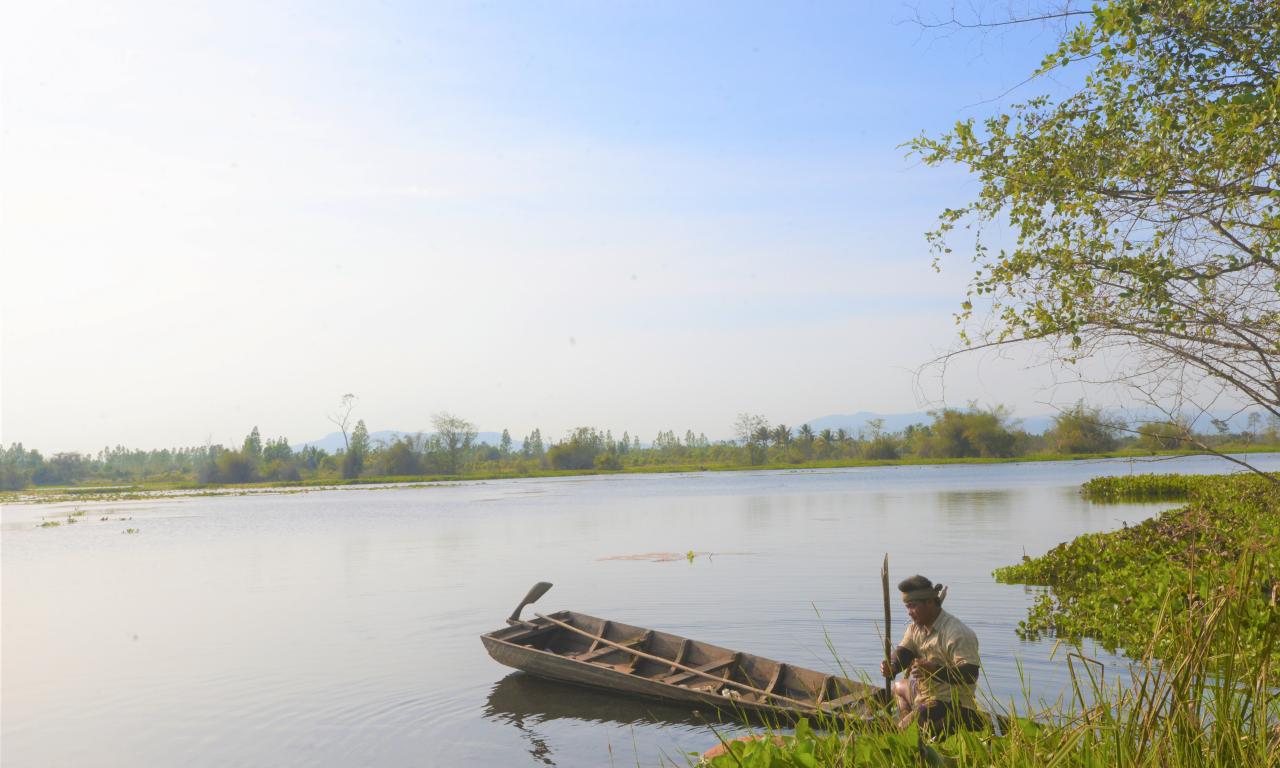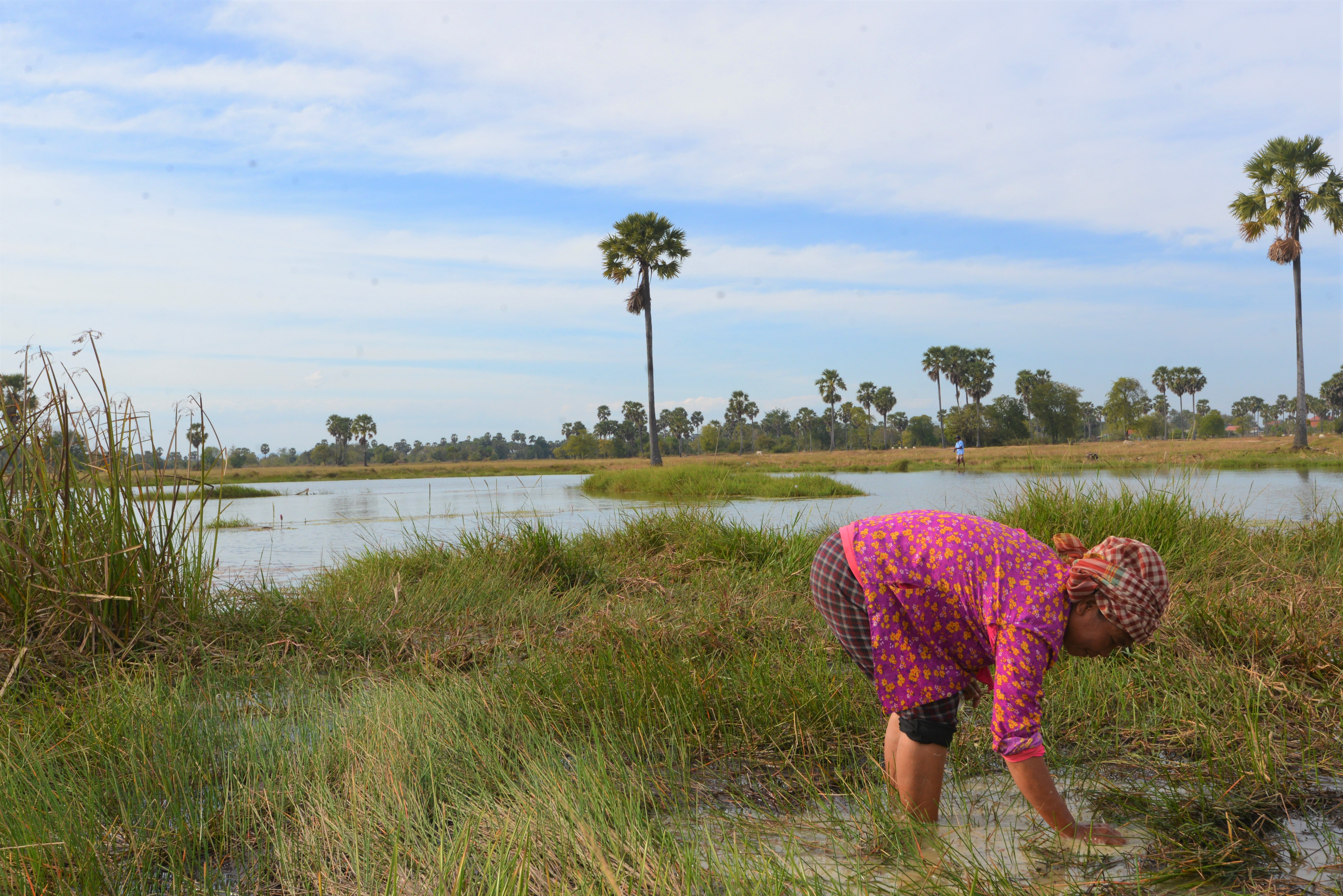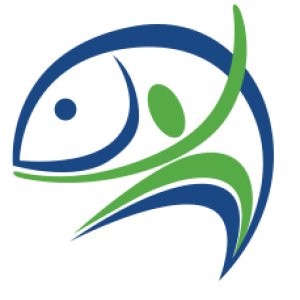
- Fish and other aquatic foods are the primary protein source of Cambodians and the fisheries sector employs a disproportionately high percentage of the population.
- The 'Sustainable Aquaculture and Community Fish Refuge Management' project aims to increase Cambodia’s food-insecure population's access to more fish products and boost incomes from sustainable aquaculture and resource-friendly pond farming and rice field fishing.
- An effective CFR management system allows for transparent dialogue and joint action by the community, commune councils, and NGOs, and the development of community-led action plans that promote sustainable management of community-based rice-field fisheries systems and reduced illegal, unreported, and unregulated (IUU) fishing practices.
Cambodia has experienced consistent economic growth and a reduction in poverty over recent years, however, rural populations continue to face many challenges. Due to frequent losses in harvest and income as a result of climate change and the diminishing availability of natural resources, sustaining everyday life is increasingly challenging.
Fish and other aquatic foods are the primary protein source of the local diet and provide a high proportion of essential micronutrients and vitamins. Similarly, the fisheries sector employs a disproportionately high percentage of the population. The region around the Tonle Sap Lake is especially dependent on fisheries with its vast area of flood plains and seasonally inundated rice fields. Overfishing, pollution, climate change, and increasing demand for fish protein are only a few of the challenges for the fisheries sector.
Having a small pond on the premises of a rural residential area means adding a productive asset to improve the devastated rural livelihood portfolio. This kind of earthen pond can supply water for domestic consumption, animal watering, growing fish, and watering home gardening, especially in the dry season due to frequent droughts.
The farmer’s main income often depends only on selling “paddy”, which is not guaranteed as frequent droughts and floods threaten the rice yields. Therefore, the diversification of activities is key for their livelihood security. The 'Sustainable Aquaculture and Community Fish Refuge Management' project works with 400 small-scale aquaculture farmers in Cambodia’s province of Kampong Thom. The project supports one-half of the farmers by excavating a fishpond, while the other half have their existing fishponds renovated.
With regular onsite technical support from WorldFish, the project aims for affordable costs of small-scale aquaculture to become the new livelihood activity of choice for these farmers. Furthermore, the farmer’s creativity is asked as the water of their fishponds can have multiple uses e.g., watering their vegetables and other crops in the dry season. This helps them better secure the status of their food security and promotes additional household income as well.
The basis for women’s inclusion in community work and decision-making

Through the WorldFish-led, GIZ-funded 'Sustainable Aquaculture and Community Fish Refuge Management' project, local fish farmers like Ms. Nov Sophy can learn and benefit from the project. Her pond is supplying sufficient supplemental aquatic foods for her household and earns her approximately USD 60 per production cycle from selling the remaining fish. She also earns an extra income of USD 30 from selling the vegetables from her garden. This income security is important for supporting her two kids going to school. This forms the basis for women’s inclusion in community work and decision-making.
"These incomes may not be much for the rich, but they are really important for rural people like us," Ms. Nov Sophy added.
The practicality of these homestead aquaculture ponds has also been attracting more women's participation at the community level. However, to have the majority of women participate in the project activities actively, the project faces two main challenges, one internal, one external, showing women struggle to perform their duties on Community Fish Refuge (CFR) Management Committees, namely, women don’t have enough time, have low or no educational background, or that CFR is not appropriate for women.
To mitigate these challenges, the project consistently works to raise awareness among CFR Management Committee members and the broader community on gender roles and to minimize the negative perception toward women handling community work. It is important to recognize and emphasize that it is not only about increasing the number of women in management and decision-making positions but also that these women play active roles and receive concrete support from men and the wider communities.
“I must admit that I did not know much about the importance of having women join the (CFR Management) Committee. After I received training on gender roles and I better understand, I realize that women are as important as men in doing community work. So, my male colleagues and I work together and support the female CFR Management Committee members to perform their jobs,” Mr. Ly Peng Chhoun, CFR Chief, Boeng Khangek Ngout.
“As a woman, I know that not only me, but other women in the community also feel proud to work for the community provided that the society accepts and supports us in decision-making positions. After several elderly people from the community approached my husband and suggested he encourage me to become a candidate, I decided to play a more active role in community development and stand as a candidate for a position on our CFR Management Committee,” Ms. Sokh Samart, a woman CFR Management Committee member, Boeng Khangek Ngout.
Women themselves express that they are interested in taking part in community development work, however, they have limited time available and are afraid that they could not do much to help the community as they feel inferior to men in terms of capacity and worry they may not be accepted by the community. It is important to recognize and emphasize that it is not only about increasing the number of women in management and decision-making positions but also that these women play active roles and receive concrete support from men and the wider communities.
This news article originally appeared on Sector Network Natural Resources and Rural Development Asia and the Pacific (SNRD Asia and the Pacific) and is part of GIZ’s knowledge management initiatives in Asia.
